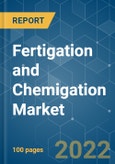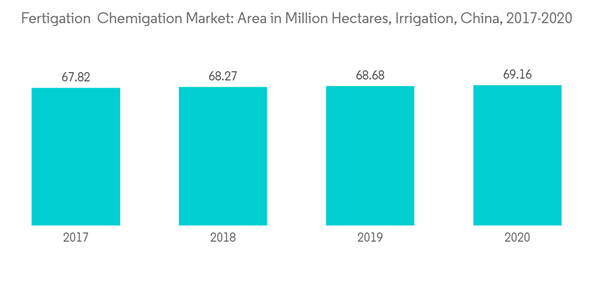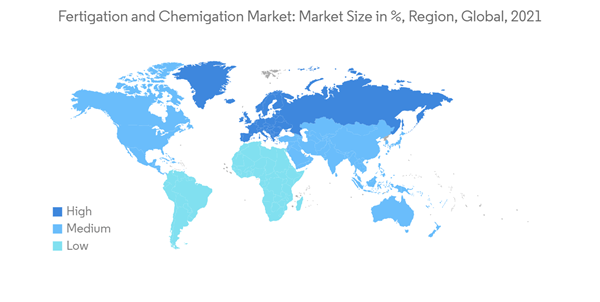The market across the world is gaining momentum due to the rising popularity of irrigation techniques, owing to the constant quest for high crop productivity accompanied by water scarcity spread across continents amid the ever-rising global population. The technique is less labor-intensive and utilizes drip and sprinkler irrigation for the improvement of crop quality. The market is driven by the benefits offered by the adoption of fertigation and chemigation techniques like high efficiency of nutrient utilization, minimal nutrient leaching losses, better growth, yield, and quality of crops. Uniformity of application is the key factor in successful fertigation and chemigation.
Key Market Trends
Increase in Awareness of Drip Irrigation System is Driving the Market
The drip irrigation segment is projected to witness the highest CAGR during the forecast period. Mostly, subsurface drip irrigation systems are used in the countries to augment fodder maize production. This results in enormous financial savings and has led to higher revenues globally in the micro-irrigation systems market. Drip fertigation is widely used in vegetable and fruit plant production in China, yet an efficient, practicable, and cost-effective drip fertigation system is lacking for maize production. However, fertigation in maize is found to increase maize yield, water and nutrient use efficiency, and economic benefit synchronously in sandy soil. Alongside the adoption of irrigation practices, the demand for these fertigation products is anticipated to grow in the forthcoming year.
To reduce the consumption of water and maximize agricultural productivity, the government in developing economies like India, China, and Brazil are trying to introduce different innovations. Irrigated area accounts for nearly 48.8% of agricultural land in India. Department of Agriculture, Cooperation & Farmers’ Welfare implemented the Per Drop More Crop Component of the Pradhan Mantri Krishi Sinchayee Yojana (PMKSY-PDMC). The PMKSY- PDMC focuses on enhancing water use efficiency at the farm level through Micro Irrigation viz Drip and Sprinkler Irrigation System. Hence, as farmers are increasingly relying on irrigation techniques, the opportunities for expansion of these fertigation and chemigation products are immense.
Europe Dominates the Fertigation and Chemigation Market
Europe leads the fertigation and chemigation market in terms of revenue as of 2019. The increasing population and their demand for a better quality of crops across the region are driving the market. Fertigation and chemigation facilitate minimal nutrient losses in terms of leaching, high efficiency of nutrient utilization, along with better growth, quality, and yield of crops. Awareness about the benefits of using these techniques is widespread in the European countries, including the United Kingdom, France, Spain, and Germany, as a lot of research work is actively conducted in these countries. The Toro Company, Rivulis Irrigation, Valmont Industries Inc., and Lindsay Corporation are active companies in the region as they are expanding and launching products to enhance their market share in the region.
Competitive Landscape
The fertigation and chemigation market is consolidated, with a few companies occupying a major chunk of the market share. The market is characterized by mergers and acquisitions, partnerships, product launches, and research and developments, among other activities. For instance, Toro’s award-winning drip irrigation recycling service is a result of an ongoing commitment to helping farmers maximize crop production with efficient and sustainable irrigation practices, including the recycling of spent drip irrigation tapes and driplines. In partnership with Revolution Plastics, the service uses recycled materials to make plastic can liners and other agriculture and construction sheeting, rather than sending the used materials to a landfill.
Additional Benefits:
- The market estimate (ME) sheet in Excel format
- 3 months of analyst support
This product will be delivered within 2 business days.
Table of Contents
Companies Mentioned (Partial List)
A selection of companies mentioned in this report includes, but is not limited to:
- Valmont Industries Inc.
- The Toro Company
- Jain Irrigation Systems Limited
- Lindsay Corporation
- Rivulis Irrigation
- Netafim
- Rain Bird Corporation
- T-L Irrigation Co.
- Nelson Irrigation Corporation
- EPC Industrie Limited










